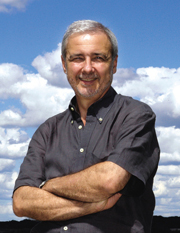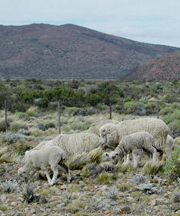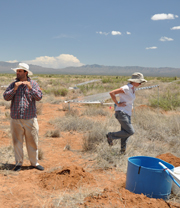|
January 27, 2011
Dear Board Member,
Please take a moment to review this month’s briefing on recent news and activities in sustainability. On page two, we introduce Dr. Osvaldo Sala, an international leader in assessing the effects of climate change on regional ecosystems.
Highlights of ASU sustainability activities
With the direction and support of President Crow and Provost Capaldi, the Global Institute of Sustainability created two new titles to formally recognize more than 200 ASU faculty members across all four campuses substantively involved in sustainability research. The new titles are: Senior Sustainability Scientist (or Scholar at the faculty member’s discretion) and Distinguished Sustainability Scientist (or Scholar). The “Distinguished” title designates those who have earned highly significant honors for their work in sustainability. These new designations will highlight the broad and significant reach of sustainability research underway at ASU and facilitate a faster pace of discovery. All of the designees are now affiliated with the Institute.
Read more » Two Senior Sustainability Scholars in the Global Institute of Sustainability addressed international climate change conferences to provide information about key legal issues affecting global action. Both are also professors in ASU’s Sandra Day O'Connor College of Law. Daniel Bodansky, speaking at the United Nations Climate Change Conference in Cancun, Mexico, discussed the implications of the new and much slower evolutionary path countries are taking toward legally binding commitments on climate change. Ken Abbott, speaking at a Durham, England, conference on transnational governance issues related to climate change, helped frame research efforts seeking to understand how private companies and other institutions interact across borders to affect climate issues.
Read Bodansky » | Read Abbott » -
Two multinational corporations headquartered in Europe turned to the Global Institute of Sustainability to provide the latest information on trends in sustainability and sustainability science. TUV Rheinland, a worldwide provider of safety and standards assessments and certifications, and Henkel, a global provider of consumer and industrial products, each asked Rob Melnick to advise top administration on their sustainability platform. Rob spent considerable time with the CEO’s of the companies, each of which operates in more than 60 countries.
-
The Carnegie Foundation for the Advancement of Teaching and the Council for Advancement and Support of Education have named Distinguished Sustainability Scientist Jane Maienschein the 2010 Arizona Professor of the Year. Maienschein has previously been honored as a Regents’ Professor and Parents Association Professor in ASU’s School of Life Sciences, where she directs the Center for Biology and Society. She is the 10th ASU educator to be selected as a U.S. Professor of the Year by the two organizations since the program’s start in 1981.
Read more »
A study by the W. P. Carey School of Business on the economics of solar energy generation ranks Arizona and Colorado as the two states that would benefit most from generating solar energy for export to other states. Hawaii and New Mexico, meanwhile, rank as the top states that would benefit from deploying solar generation for domestic consumption. The study, led by assistant research professor Matthew Croucher, ranks all states according to several criteria, including solar potential, output efficiency, carbon emissions from current power plants, and price of electricity. Findings from the research were published in The Electricity Journal.
Read more »
Please email or call us with any questions or comments about this briefing.
Best regards,
cc: Jim Buizer
� |
Q&A with Dr. Osvaldo Sala
creating scenarios for protecting Earth’s ecosystems
|
|
Osvaldo Sala is a Distinguished Sustainability Scientist in the Global Institute of Sustainability and Julie A. Wrigley Chair and Foundation Professor in the School of Sustainability and in the School of Life Sciences. He is recognized as an international leader in ecological and global environmental science through his work as past president of the Scientific Committee on Problems of the Environment and as coordinating lead author of the Millennium Ecosystem Assessment. The latter was a five-year research effort by more than 1,000 of the world’s leading scientists to assess the state of the world’s ecosystems and the services they provide.
At what point did sustainability become part of your research focus?
In my early academic career as an agronomist in Argentina, I saw direct evidence of overgrazing in Patagonia and depletion of soil fertility in the Pampas. This convinced me that current practices were not sustainable and that we needed to make radical changes in natural resource management.
What are your most important sustainability-related research projects?
I am working on a regional-scale project to assess the sensitivity of North American ecosystems to climate change. Sensitivity is one of two main factors determining the impacts of climate change on an ecosystem – the other factor being the rate of warming. Yet while relatively much is known about the rate of warming, little is currently known about ecosystem sensitivity. Our research thus far reveals large differences between ecosystems in terms of their actual response per unit of warming.
I have also developed scenarios for global biodiversity change over the next 50 and 100 years that will simplify our understanding of these complex systems. As a part of this work, I am analyzing how a broad range of socio-economic conditions, such as degree of globalization, might affect biodiversity in different regions of the world.
How do you think your research will affect decision-making?
By uncovering how different ecosystems respond to climate change, we can significantly improve our ability to predict the impacts it will produce in different regions. This will help us predict change and develop mitigation actions tailored to each region.
What is the world sustainability challenge that concerns you most?
Climate change is our most important sustainability challenge. The scope of the problem and its intricate relationships with development and economic growth will leave no one untouched.
|
|

Dr. Osvaldo Sala
|

Sustainable management of grazing in arid Patagonian ecosystems requires assessing the different services that they provide including food, fiber, carbon storage, and conservation of biodiversity.
|

Graduate students work in a large-scale field experiment in the Chihuahuan Desert, NM, where they manipulate rainfall to simulate the major effects of climate change in arid ecosystems.
|
|
|






